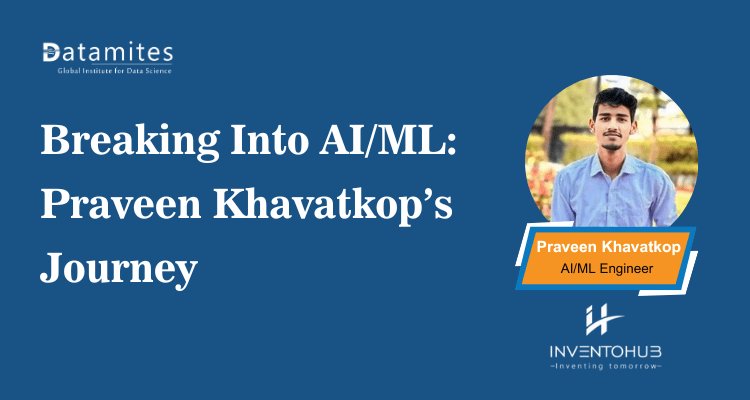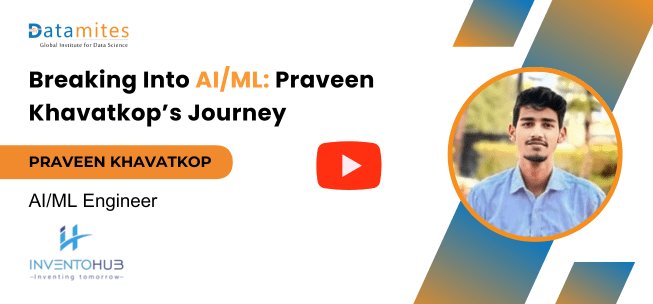Praveen’s Transformation: Student to AI & Machine Learning Engineer
Discover how Praveen transitioned from a student to a skilled AI & Machine Learning Engineer, mastering Python, SQL, and machine learning through hands-on projects and expert guidance.

Dreams often feel distant until determination, the right guidance, and consistent effort bring them to life. Praveen’s journey is the perfect example of how passion for technology, when paired with the right learning path, can completely transform a career. From being a curious student eager to explore the world of data to becoming a skilled AI & Machine Learning Engineer, his story is not just about acquiring technical expertise, it's about resilience, growth, and unlocking future-ready opportunities in one of the fastest-growing fields of our time.
Q&A with Praveen: Insights for AI/ML Aspirants
Discover the journey of Praveen, a fresh graduate who successfully transitioned into an AI/ML Engineer role. Gain valuable insights from his experience, preparation strategies, and tips for aspiring data science professionals.
Q1. Can you start by introducing yourself?
Hello, my name is Praveen Khavatkop. I am currently based in Bangalore. I completed my graduation in B.Sc. Computer Science from Rani Channamma University Belagavi in 2023. In January 2024, I joined DataMites, where I pursued a data science course. During my training, I learned Python, SQL, machine learning, and deep learning. I also worked on multiple projects, including client projects and capstone projects, which gave me hands-on experience.
Q2. What was your academic background before entering data science?
I come from a computer science background, so I already had exposure to programming languages like Python and Java at a basic level. This helped me adapt quickly when I joined the course, as coding was not entirely new to me.
Q3. How much coding knowledge is required to start in data science?
For beginners, the most essential skills include Python, SQL, machine learning, and deep learning. These are the core pillars of data science. However, you don’t need to be an expert coder when starting out basic Python is enough to begin. As you progress, you’ll naturally build your coding confidence.
Q4. How important is statistics in data science?
Statistics plays a crucial role in data science because it forms the foundation of machine learning algorithms. For example, regression models, classification models, and clustering techniques rely heavily on statistical concepts. So, a strong understanding of statistics, along with programming, is necessary to succeed in this field.
Q5. How did you prepare for job interviews in data science?
I applied to multiple companies through DataMites and attended around 4–5 interviews. At first, I struggled to perform well, but those experiences helped me understand the process better. Later, I improved my performance and finally got selected by a company through consistent practice.
The mock interviews conducted by DataMites also helped a lot. After my first mock interview, I was advised to strengthen my SQL skills. I worked on it, and by the second mock interview, I performed much better.
Q6. What kind of interview questions did you face?
Most interviews started with self-introduction and then moved to project explanations. For example, I worked on a handwritten digit recognition project, and I was asked to explain it in detail. The challenge was to explain it not only to technical people but also to non-technical stakeholders in simple terms. This improved my communication skills, which is just as important as technical knowledge.
Q7: Is this your first job in the data science field?
Yes, this is my very first job. It feels very exciting to begin my professional journey in AI/ML.
Q8: What does your new role as an AI/ML Engineer involve?
My role includes:
- Extracting and cleaning data (structured & unstructured).
- Building and applying machine learning models.
- Predicting outcomes using AI/ML algorithms.
- The company operates in the marketing industry, which makes analytics highly impactful.
Q9: How was your experience with the Placement Assistance Team (PAT)?
The PAT team was very supportive. They scheduled multiple interviews for me. My responsibility was to perform well and clear doubts. They also conducted mock interviews, where I received feedback to improve my SQL skills before the final rounds.
Q10: How long did your placement process take?
My interviews started around October, and between October and January, I attended about 4–5 interviews before getting my offer.
Q11. What advice would you give to aspiring data scientists?
- Start with Python, it's beginner-friendly and widely used in data science.
- Build strong foundations in statistics and machine learning.
- Focus on projects because they give practical knowledge beyond theory.
- Be consistent with interview practice the more you attend, the better you become.
- Communication is key. Learn to explain your technical projects in simple terms for non-technical audiences.
Refer these below articles:
- From Mechanical Engineer to AI Engineer: An Inspiring Journey of Divyansh
- Mughendhar’s Journey from Mechanical Engineering to AI Professional
- From Fresher to AI Engineer – Darshan’s Success Story
Key Takeaways from Praveen’s Journey
Here are the key takeaways that highlight his growth, mindset, and path to success.
- Educational Background: Praveen graduated in B.Sc. Computer Science from Rani Channamma University Belagavi in 2023.
- Training: He joined DataMites in January 2024, where he learned Python, SQL, machine learning, and deep learning, and gained hands-on experience through client and capstone projects.
- Prior Coding Knowledge: Coming from a computer science background, he had basic familiarity with Python and Java, which helped him adapt quickly to the course.
- Coding Requirements for Beginners: Beginners need basic Python knowledge, SQL, and foundational machine learning and deep learning skills; expert-level coding is not necessary initially.
- Importance of Statistics: Understanding statistics is crucial as it underpins regression, classification, and clustering algorithms used in machine learning.
Read these below articles:
- Generative AI and Predictive AI: Key Differences Explained
- Why Artificial Intelligence Matters More Than Ever
- How to Choose the Best Institute for AI/ML in Mumbai?
Praveen’s journey from a passionate student to a successful AI & ML Engineer is proof that with the right guidance, persistence, and hands-on practice, anyone can carve a career in artificial intelligence. His story highlights the importance of building strong foundations in programming and statistics, gaining real-world project experience, and continuously improving through interviews and feedback.
Bangalore, known as the “Silicon Valley of India,” has emerged as a key hub for AI innovation. With a strong IT ecosystem, thriving startups, and global tech giants, the city drives AI adoption across industries. Tech parks in Whitefield, Electronic City, and Manyata host R&D teams, while Artificial Intelligence Institute in Bangalore and universities collaborate with companies to advance AI and machine learning.
DataMites is a leading training institute that offers comprehensive programs in Artificial Intelligence, Machine Learning, Data Science, and other emerging technologies. Learners receive industry-recognized certifications accredited by IABAC and NASSCOM FutureSkills, along with strong placement support through resume building, mock interviews, and access to industry networks. DataMites Artificial Intelligence Institute in Pune operates from Kharadi and Baner, providing both classroom and online training options to suit diverse learning needs.

